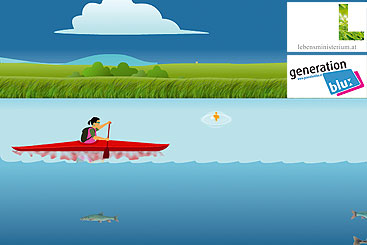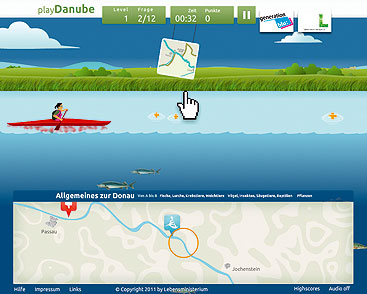The playful Danube: taking games seriously

The playful Danube: taking games seriously
A new game puts the Danube Basin and its natural and cultural treasures in the spotlight and gives players the incentive to spend time exploring the river – proving that learning doesn’t have to be boring.

In playDanube, players paddle a kayak along the course of the river in Austria. On their journey, they must circumvent obstacles, answer questions and collect bonus points.
how many windows does the monastery of Melk have? how many bridges cross the danube in austria? When does the european crayfish look for food? Players must find the answers to these and other similar questions in the new online game ‘playdanube’.
The game, developed by the Austrian Ministry of the Environment, Water Management Section, takes players on an interdisciplinary journey on the Danube as they navigate a kayak along the course of the river in Austria. Along the way, players must answer 36 questions at three different levels; the questions are chosen randomly from a large database ensuring a new experience with each game. Each question is supplemented with a short text that often hints at the correct answer, which must be chosen from multiple choice options.
For a high score, players need to circumvent obstacles, answer questions and collect bonus points on the route. If the player passes all three levels successfully, the score is entered into the high score list, which can be an incentive to compete with other players and compare knowledge and achievements. The game is available online in German and can be played as many times as one likes, all for free.
floodsIM
The largest British insurance firm, Aviva, worked with government officials and flood management organisations in the UK to develop FloodSim to help raise awareness of floods and flood risks.
The game puts players in control of flood policy decisions and spending in the UK for three years, asking them to decide how much money to allocate to flood defences, where to build houses or how best to inform people about the risk of flooding.
FloodSim helps raise awareness for long term strategy and flood prevention, and promote better drainage and flood resilient measures for houses and businesses.
Connecting a variety of landscapes and topics. Nearly all of Austria – 97% – is part of the Danube River Basin, and in the game, the course of the Danube can be tracked in a small window at the bottom of the screen, an additional tool to teach players a sense for distances and the course of the river. This helps players recognise the connections between different, seemingly unrelated areas and create a coherent image of the Austrian Danube.
While playDanube has no age limits, it is particularly useful for children and teenagers, as it covers topics such as nature, culture, tourism, history, water management, wastewater treatment and even flood protection.
Raising awareness of the unique treasures of the Danube, as well as the problems and pressures threatening the region, is an important part of protecting this vital resource. “For me it is very important to excite people about water issues,” says Susanne Brandstetter of the Austrian Ministry for the Environment. “Why not offer them an exciting, stimulating and interactive game dealing with our most important river, the Danube?”
‘Serious games’ for serious fun. Game-based learning is a useful communication tool. The term ‘serious game’ refers to games that aim to teach players facts – in contrast to jump-and-run or fighting-oriented games. Games are an innovative way to educate and entertain at the same time – ‘edutain’ – by utilising modern information technology.
Although the term is new, the concept of edutainment
is not. At its most basic, edutainment is play, and children
have always used play to learn about themselves
and their world. Edutainment provides a change of
pace in the classroom as well as an opportunity for
the student to enjoy learning. All of us, young and
old, find games engaging and we therefore voluntarily
invest our time in games. Performance naturally
increases when learners are engaged, so it makes sense
to adapt a medium that is intrinsically motivating for
education. Learning doesn’t have to be – and shouldn’t
be – boring.

Game-based learning is a useful communication tool. In playDanube, users learn about nature, culture, tourism, history, water management, wastewater treatment and even flood protection.
Reading, writing and… video games? Games in general present problem-based learning. Players encounter a problem: Solving a puzzle or a mystery, eluding a villain, finding a lost treasure – and must resolve it. The problem drives the learning, which many students respond to better than traditional lectures. In addition, most video games require players to think critically, handle resources and personnel to achieve a specific objective, and complete tasks at a fast pace and in quick succession.
In the United States, gaming didn’t just go to school – it went to university. In 2006 the University of North Carolina at Greensboro launched ECON 201, an online game for college credit. The game blends science fiction themes and economic principles in a scenario where students must direct the actions of a group of aliens who come from a world of abundance to experience scarcity, savings and investments to trade, foreign aid, and sustainable growth. In fact, the game covers more material than a traditional introductory economics course.
Bringing technology to the environment. With simple computer games currently experiencing a renaissance as classic games are revived as mobile phones apps, there are a lot of opportunities to reach users. And playDanube, which launched in February, is already getting results.
“Our tests with various users clearly showed that play-Danube is fun and teaches you knowledge about the Danube,” says Hannes Amon of Ovos, the company that created the game. “The many positive responses to the game from players confirm that our concept and our commitment in this project were right.”
The game will be an important part of celebrations for Danube Day, held on 29 June. On Danube Day, the game will be given to journalists, decision makers and government leaders as a CD ROM or USB memory stick. “I am proud of this product and I look forward to hearing from more players,” says Brandstetter. “We put a lot of work into the development of this game, but the results will justify these efforts.”
eNeRCITIes
EnerCities, launched in 2010, is an educational game about energy. The game teaches players about energy sources and the balance between people, planet and profit. The goal is to create and expand virtual cities dealing with pollution, energy shortages and renewable energy.
The project raises awareness of energy-related issues and helps players to understand, and alter, their energy attitudes and behaviours.
The game’s development partners included five educational institutions, an energy agency, an innovation company and a specialised serious gaming software development company. The project was co-funded by the European Commission programme Intelligent Energy Europe.
For more information about the game, or to try your luck as a player, please visit: www.playdanube.at.





